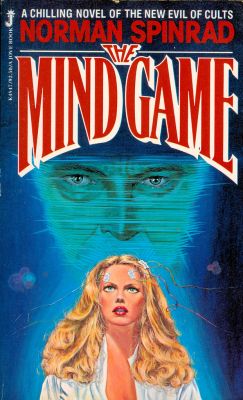
A philosophical diversion (that connects to T.O.E.):
Let's assume, for the purposes of argument, that there are such things as gods. In fact, let's assume there is only one God, and that He has the traditionally ascribed attribute of having an infinite mind.
That mind has, within its magical neural architecture, complete knowledge, which we can short-hand for the moment as: "contains all possible true statements in propositional form." One such statement might be, for example, "On June 17th at 11:59 the sky over Altoona was robin's egg blue." Yes, an infinite regress pops up here, as there are also true statements asserting the truth-value of previous statements--"It is true that on June 17th at 11:59 . . ."--and so on. No matter--you can't crowd infinity.
Now, dismiss the rest of God's purported attributes; all we're after is a mind that knows all things. Does such an Infinite Mind--call it the I.M.--know itself to be the Infinite Mind? Does God know He is God?
At first blush, the answer would seem to be yes. There are a few ways to get there. The simplest is that the I.M.'s being infinite is, indeed, a fact (though not a fact of nature, exactly, unless you are Spinoza). As a fact, it is contained, propositionally, in the Infinite Mind. Thus the I.M. knows that it is the I.M., in the same way it knows the shade of blue above Altoona.
There are other ways in. It's possible that I myself might know the I.M. to be infinite (Really? Sure. I know the integers to be infinite, without having counted them all up), and I cannot know more than the I.M.; therefore anything I know, the I.M. knows. You can think up variations as time and your own taste permits.
Now--enter the evil daemon.
Descartes, in his *Meditations on First Philosophy*, famously introduces the possibility that his ratiocinations are being systematically thrown off the rails by an "evil daemon" bent on confounding his thought. The E.D. makes Rene *think* he has a body, makes him *think* there is an external world, and so on, when in fact none of this is objectively so. (One of the many side-roads this leads us on: how can the E.D. be sure it doesn't have its own E.D.?) This is sometimes called the "brain in a vat" scenario, invariably linked these days with *The Matrix* and its lamentable sequels.
Don't be put off guard by the various pulp versions of this conundrum, though; the E.D. is epistemological acid. When much of Descartes' thought has devolved into being of merely historical interest, this agent of radical skepticism will still be working to undermine our surety.
So, is the I.M. susceptible to the E.D.? Can even God be unsure as to whether He is really just a brain floating in a vat?
I would propose that the answer is yes--even an I.M. fails to achieve absolute certainty. For all it knows, that is, the I.M. may not be an I.M. at all.

To see why, suppose now that there is a finite mind--the F.M.--that is being misled by the E.D. to think itself an I.M. To the best of *its* knowledge, every possible true statement is contained propositionally inside itself, including the true statement that it contains all possible knowledge. However, the F.M. is wrong. The E.D. is only making it *think* that it knows all things, while at least one truth is escaping it: the true statement "the I.M. is, in fact, a F.M."
Technically the F.M. need not even be finite; an infinite collection may fail to be exhaustive, as do the natural numbers. Very good; let it be infinite but non-exhaustive, endlessly thinking an unlimited number of truths but never noticing the missing one. The point is that exactly because the F.M. does not have access to that hidden truth, it cannot tell that its contents are not exhaustive. Nor does it have access to such true statements as "My thoughts only *seem* to be exhaustive." Therefore it cannot distinguish itself from the true I.M.
Now you see the problem. The *true* I.M. is in exactly the same epistemological position. The I.M. believes itself to know all things, including the (seemingly) true proposition that it knows all things. As it happens, the I.M. is correct. And yet the I.M. cannot confirm that belief, as the F.M. draws the same conclusion, from the same data (the proposition "My thoughts only *seem* to be exhaustive" doesn't occur in the true I.M. either). Thus the I.M. can't be certain it isn't the F.M. In figurative speech, even God couldn't be sure that He was God.
The application of the E.D. to T.O.E.? I can think of a few. Clearly there's a problem with the very concept of exhaustive, or absolute, knowledge. And it doesn't look like a small one.
But first we'll see what you have to say.